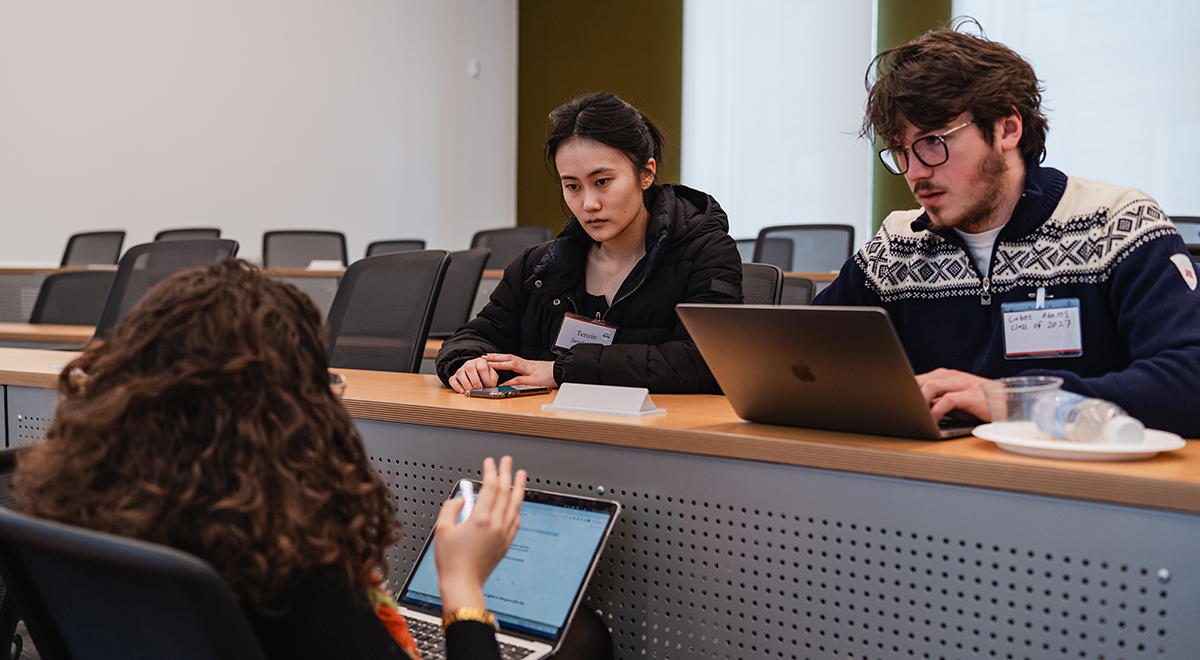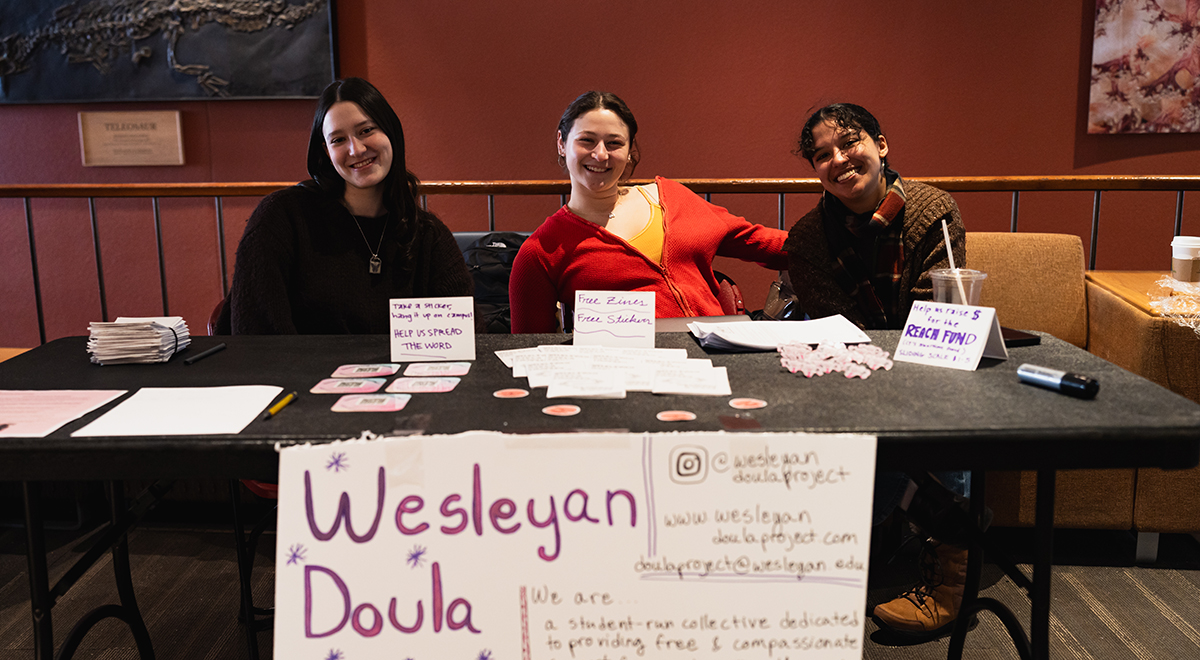Students Engage with Democracy at Media Literacy Workshop, Civic Action Fair

By Rose Chen ’26
Wesleyan University’s Democracy in Action convening kicked off Feb. 16 in the John B. Frank Public Affairs Center with a media literacy workshop. Led by Associate Professor of Government Logan Dancey, the session was designed to teach participants to laterally read and ask questions when consuming content.
Dancey’s tutorial of government students helped attendees—students, other professors, and community members—fact-check claims across a variety of sources, determine the credibility of claims, and critically engage with political media. During the session, Dancey and those students, Julia Armeli ‘25, Sophie Fetter ‘25, and Rory McClenahan ‘24 discussed a selection of online posts on climate change, gun ownership, and misconduct in an election case. They also offered resources for mindful consumption of social media.
The workshop drew from the Civic Online Reasoning curriculum from the Digital Inquiry Group, as featured in NPR, The Wall Street Journal, and Time Magazine.
“As someone who’s not majoring in the social sciences, I thought it was very accessible,” Nicole Allina ’24 said. “It had an emphasis on social media, which I think everyone uses, regardless of what your interests of studies of interests are. It was very hands on. … We actually took three different claims put on Twitter and analyzed them which I thought was an interesting way to put ideals into practice.”
The Democracy in Action convening also afforded students the opportunity to learn about a diverse range of civic organizations they can participate in, on-campus and off, through a student-hosted civic engagement fair held in the lobby of Exley Science Center that afternoon.
Passing students stopped to speak to organizers and members about the opportunities to channel their passion for positive change into initiatives ranging from healthcare and environmental protections to engage with Middletown residents and school programs.

According to Professor of the Practice Amy Grillo and Civil Engagement Fellow Marcus Khoo, both of the Albritton Center for the Study of Public Life, the Fair brought together various student-run volunteer programs and community partners, including Adolescent Sexual Health Awareness, Cultivating Justice, Wesleyan Doula Project, City of Middletown Recycling Program, Traverse Square After-School Program, Environmental Solidarity Network, University Network for Human Rights, Wesleyan’s Center for Prison Education, and the Wesleyan Argus.
“We also have voter registration because that’s another key part of civic engagement, especially at an American institution,” Khoo said. “We have an election cycle coming up, so we wanted to make that accessible and part of the parcel of what’s civic engagement is here.”
Grillo also emphasized the offerings already present within the academic curriculum with the Civic Engagement Minor, which offers nearly 20 courses this semester.
“Part of Wesleyan’s identity is related to civic engagement—students come here hoping to be civically engaged and wanting to make a difference,” Grillo said. “We have many, many students here who are basically almost completing the [civic engagement] minor without even knowing it, because so many of our students are engaged in volunteering or community work. … For Wesleyan students, if you graduate with a minor in civic engagement, you’re going to get asked questions about it, and that really gives you a chance to talk about what you care about.”
Kenny Morris, Communication and Community Engagement Coordinator at University Network for Human Rights, also spoke to the civic engagement opportunities offered within the Human Rights Advocacy Minor.
“What that entails is a few classes about what it means to be an ethical and effective advocate,” Morris said. “We teach you how to interview, how to protect yourself against data attacks, everything you need to be an advocate in the 21st century. And then you would then go abroad to work with a grassroots community, grassroots social movement, that we have decades long connections and relationships.”
Each of these movements have their own advocacy strategy, which the University Network supports. For instance, students involved in the program recently have been working with communities in the disputed territory between Armenia and Azerbaijan.
“We’ve gone on at least five fact-finding trips with students to interview different kinds of stakeholders, including people who are former prisoners of war, and many different kinds of human rights stakeholders,” Morris said.
More locally, Krishna Winston, Director of Susan B. and William K. Wasch Center for Retired Faculty and Chair of the Recycling Commission for the City of Middletown, has been working on recycling and resource management, recently putting forth the trash sorting program for Middletown houses—including Wesleyan’s woodframes—that has drastically reduced the amount of waste that has to be sent out of state.
“We can always use extra hands, we can use the creativity, we can use the fresh thinking,” Winston said. “I know that young people are really good at using these platforms to make printed matter that’s more attractive and eye catching. If [students] have interests in public policy and public practices and would like to see a small city in action, they can get involved, they can come to our meetings, they can participate.”

